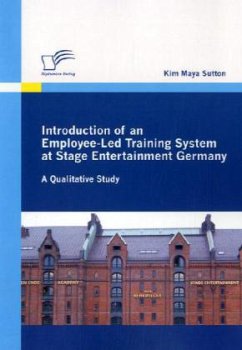Particularly in times of a crisis, an employee-led training (ELT) system is a cost-efficient way to give employees the further education they deserve and need to stay on top of things, and to increase their ability to be efficient and effective.
An ELT system accrues very few costs while having copious benefits, such as motivated, broadly positioned employees who understand the procedures and interfaces in the company and can thus work much more efficiently, while being enabled to network, cooperate, and communicate on a new level. The employees will identify with the organization and the solidarity between headquarters and branch offices will enhance tremendously. The seminars are well targeted and easy to understand for the employees, as a colleague, who knows exactly which lingo and examples to use, holds them. The knowledge transferred is practical and the employees can implement it into their daily work immediately. The organization itself not only becomes transparent towards its employees, it also sets a new standard by pointing out that employer-employee work relationships can go beyond the maliciously obedient work that is rewarded with a pay-check at the end of the month.
All parties involved benefit from the ELT system and it requires a minimal amount of administration work, which the personnel development within the HR department covers. The extra work that has to be conducted by the in-house trainers is factually compensated by their chance to distinguish themselves in the organization and to further their work portfolio. They become powerful multipliers.
This study sheds light on the ELT system using the practical example of Stage Entertainment Germany, while providing a process description, describing assets and drawbacks, as well as the implementation of the resulting improvements in the new business year. It can be used as a guide to implement an ELT system at a similar organization.
Hinweis: Dieser Artikel kann nur an eine deutsche Lieferadresse ausgeliefert werden.
An ELT system accrues very few costs while having copious benefits, such as motivated, broadly positioned employees who understand the procedures and interfaces in the company and can thus work much more efficiently, while being enabled to network, cooperate, and communicate on a new level. The employees will identify with the organization and the solidarity between headquarters and branch offices will enhance tremendously. The seminars are well targeted and easy to understand for the employees, as a colleague, who knows exactly which lingo and examples to use, holds them. The knowledge transferred is practical and the employees can implement it into their daily work immediately. The organization itself not only becomes transparent towards its employees, it also sets a new standard by pointing out that employer-employee work relationships can go beyond the maliciously obedient work that is rewarded with a pay-check at the end of the month.
All parties involved benefit from the ELT system and it requires a minimal amount of administration work, which the personnel development within the HR department covers. The extra work that has to be conducted by the in-house trainers is factually compensated by their chance to distinguish themselves in the organization and to further their work portfolio. They become powerful multipliers.
This study sheds light on the ELT system using the practical example of Stage Entertainment Germany, while providing a process description, describing assets and drawbacks, as well as the implementation of the resulting improvements in the new business year. It can be used as a guide to implement an ELT system at a similar organization.
Hinweis: Dieser Artikel kann nur an eine deutsche Lieferadresse ausgeliefert werden.








